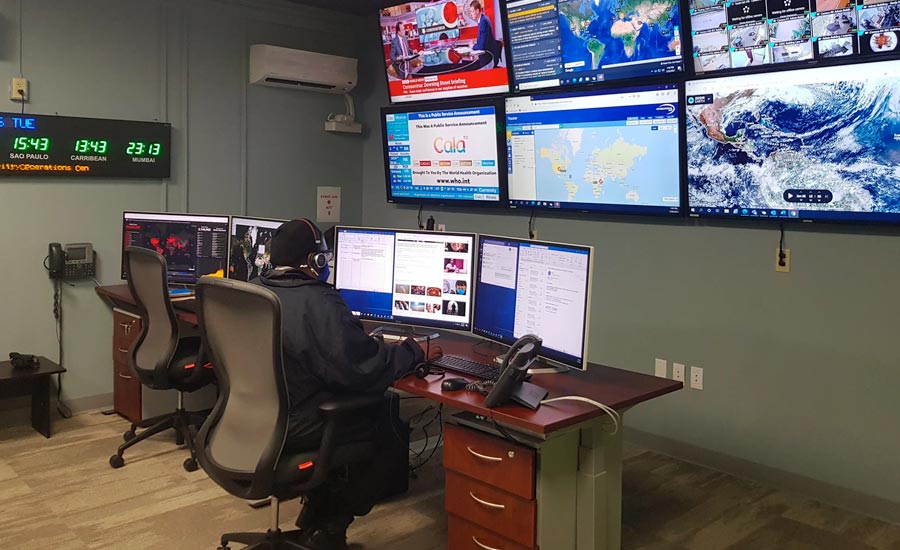Adtalem Global Education Inc. is a workforce solutions provider and the parent organization of nine institutions and companies, including the American University of the Caribbean School of Medicine, Association of Certified Anti-Money Laundering Specialists (ACAMS), Becker Professional Education, Chamberlain University, EduPristine, OnCourse Learning, Ross University School of Medicine, Ross University School of Veterinary Medicine and Walden University.
With a mission to provide global access to knowledge that transforms lives and enables careers, Adtalem has a presence in 209 territories and countries and 27 operating campuses, with more than 10,000 employees, including 3,100 professors.
Leading the Enterprise Safety and Security group at Adtalem is Robert Soderberg, Vice President and Chief Security Officer, who strives to provide the best security services, support and response to the tens of thousands of students, faculty and employees at a global scale. “Their safety is of the highest concern,” he says.
As Vice President of the Enterprise Safety and Security group, Soderberg plays a vital role in supporting Adtalem assets in all areas of security, including crisis management, emergency response, travel risk management, site and special event security, business continuity, executive protection, enterprise security risk management, security investigations, colleague and student awareness and training and more.
Serving tens of thousands of stakeholders across the world, Soderberg and the Enterprise Safety and Security group have delicately crafted approaches toward safety and security with a focus on continuous improvement to provide community members a safe and secure environment that will allow them to flourish. “To ensure the sustainability of the operation and the continuity of operations, we support the enterprise in various areas by having robust and mature plans in place from a business continuity and crisis management standpoint,” Soderberg says.
One critical achievement over the past year for Soderberg and the Enterprise Safety and Security group was the creation of the Security Improvement Plan, which allows the group to pinpoint the exact state of their safety and security. The plan entails a gap analysis of the entire Enterprise Safety and Security program and solidifies the program’s mission and vision for the future to operate with responsibility and resiliency, Soderberg says.
“We identified various focus areas, such as program management, governance, risk management and compliance and measured initial maturity to allow us to improve our program and continue to assess priorities, current maturity ratings and overall trends,” he says. “I am proud to say our program maturity is in an excellent state, surpassing our initial near-term goal. It’s truly a testament of the team we have in place at Adtalem, not only the enterprise safety and security group, but also our leadership and the board, which have always supported the Security Improvement Program.”
One of the workstreams identified in the Security Improvement Program was the need for an enterprise-wide security crisis management program, Soderberg says. The COVID-19 pandemic, coupled with increasing risk of environmental threats and crisis, highlighted the need to be proactive during disruption. To coordinate efforts and ensure preparedness, the Enterprise Safety and Security group prioritized crisis response and management procedures and worked to include an eLearning program and tabletop exercises that assess the impact of a crisis on employees, assets, operations, stakeholders and reputation, help with awareness and manage risks in a time of disruption, and create a playbook for developing a proportionate crisis and resilience response plan.

Helping oversee the crisis management program and all company assets is Adtalem’s Global Security Operations Center (GSOC), which has been operating since July 2020. The GSOC utilizes a hybrid-staffing model as a 24/7/365 operation, with duty officers that support Adtalem assets enterprise-wide. Image courtesy of Adtalem
In addition, throughout COVID-19, the Enterprise Safety and Security group has actively strategized and developed management and response tactics to facilitate return-to-work and return-to-campus, creating guidelines to ensure standardization as well as publishing weekly readiness prognosis reports and vaccine mandate compliance dashboard reports. The group also conducted various surveys, both internal and external, to gauge readiness factors across sectors and led the Vaccine Policy Working group along with managing the vaccine card process (review, approval, etc.) for students and employees.
Another major accomplishment for the Enterprise Safety and Security group was developing a Campus Risk Report (CRR) tool, which allows the group to track and monitor campuses to quickly respond to high risks and further identify which campuses need risk assessments, frequent inspection and support. Soderberg explains, “The CRR rates/measures several risks and then ranks sites as extreme, high, medium or low. The CRR supports the security risk assessment program as well as our duty of care mission.”
To further enhance training and awareness, the group launched Adtalem Safe — a smartphone awareness app that provides mass notification and awareness regarding potential risks to any campus, facility or individual. “We have a high level of participation from both employees and students. The app has been key in facilitating return-to-work procedures, COVID-19 tracking and monitoring, as well as awareness and crisis management,” Soderberg says.
The app, Soderberg says, has helped better prepare individuals for crisis events as well as share key details on related protocols and procedures. The tool has been vital as many of Adtalem’s community members are located in areas that can be vulnerable to crisis events.
Soderberg explains, “The app, coupled with our enterprise-wide crisis management program, complements our hurricane playbook. We’ve got medical schools in the Caribbean, located in St. Martin, Barbados and a veterinary school located in St. Kitts. They are at increased risks of hurricanes, so we spent a lot of time and effort to ensure that we have plans and procedures in place to prioritize emergency response risk management to prepare for and bounce back from natural disasters.”
TOP 3 CRITICAL ISSUES:
• Business continuity and business resilience
• Program maturity
• Crisis management
Helping oversee the crisis management program and all company assets — 103,000 students, 10,300 employees, nine institutions and companies, 209 territories and countries, 27 operating campuses, 19 administrative offices, 2,700 students on clinical rotations and 75 daily travelers — is Adtalem’s Global Security Operations Center (GSOC). Located at the Ross University School of Medicine in Barbados, the GSOC is housed in what Soderberg calls a “Category 5” facility, designed to withstand the catastrophic damage and powerful wind speeds of a Category 5 hurricane.
Operating since July 2020, the GSOC utilizes a hybrid staffing model for 24/7/365 operations, with duty officers that support Adtalem assets enterprise-wide. In addition to supporting the Ross University School of Medicine campus and housing operations in Barbados, the GSOC helps monitor global events and impact to company assets; manage the travel risk management program; vet employee ground transportation in high and extreme risk regions; manage crisis events to include communicating critical information to key stakeholders and coordinating support as needed; issue more than 320 global advisory awareness reports enterprise-wide; and monitor social media for potential threats.
The GSOC, Soderberg says, is a vital part of the Enterprise Safety and Security group’s value proposition. “The GSOC and the duty officers help track all of our assets worldwide. We get valuable information relative to threats and increased risks. If there’s an event that happens worldwide, the duty officers at the GSOC reach out to assets to alert and inform them and ask if they need any assistance. And if they need assistance, we will engage our regional team to support our colleagues, employees and students.”
All in all, the Enterprise Safety and Security group, a shared service that supports all Adtalem’s businesses enterprise-wide, is laying the foundation for developing increased security capability that safeguards the interests of students, colleagues, facilities, reputation and brand. “I’m incredibly proud of the Enterprise Safety and Security group’s achievements. We’ve dealt with a wide variety of crisis-related incidents in the past two and a half years. I’m honored to be part of a seasoned team of professionals that not only respond to incidents to support employees and students, but also help the enterprise recover from those incidents.”
In the future, Soderberg hopes to continue to improve upon the maturity model at both the enterprise level and at the facilities, campus and institution level to create a mature enterprise-wide safety and security program. He adds, “We are a business enabler, and everything we do to identify and mitigate safety and security risks is risk-based and business-minded.”



